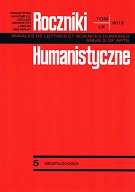Elementy kształcenia pozaformalnego jako uzupełnienie akademickiego programu kształcenia tłumaczy
Elements of Non-Formal Education as a Supplement the Formal Academic Curriculum for Translators
Author(s): Konrad KlimkowskiSubject(s): Language and Literature Studies
Published by: Towarzystwo Naukowe KUL & Katolicki Uniwersytet Lubelski Jana Pawła II
Keywords: translator education; learner autonomy; formal; informal and non-formal education; self-education
Summary/Abstract: Translation education is becoming more and more aware of the strategic status of the relationship that obtains between the student and the teacher in the translation classroom. Another more readily recognized fact is that the role of the student and the teacher must be redefined, according to the assumptions of so-called holistic, constructivist paradigms in the theory of learning. Drawing upon these two observations, the author suggests that the formal educational curriculum for translators be expanded by a set of non-formal initiatives and events. Non-formal education can help improve the curriculum in the following ways: by making it more flexible in terms of content, by opening it to the market and socio-cultural demands, by helping transform academic didacticism into real-life parameters of personal development.
Journal: Roczniki Humanistyczne
- Issue Year: 60/2012
- Issue No: 05
- Page Range: 147-159
- Page Count: 13
- Language: Polish

